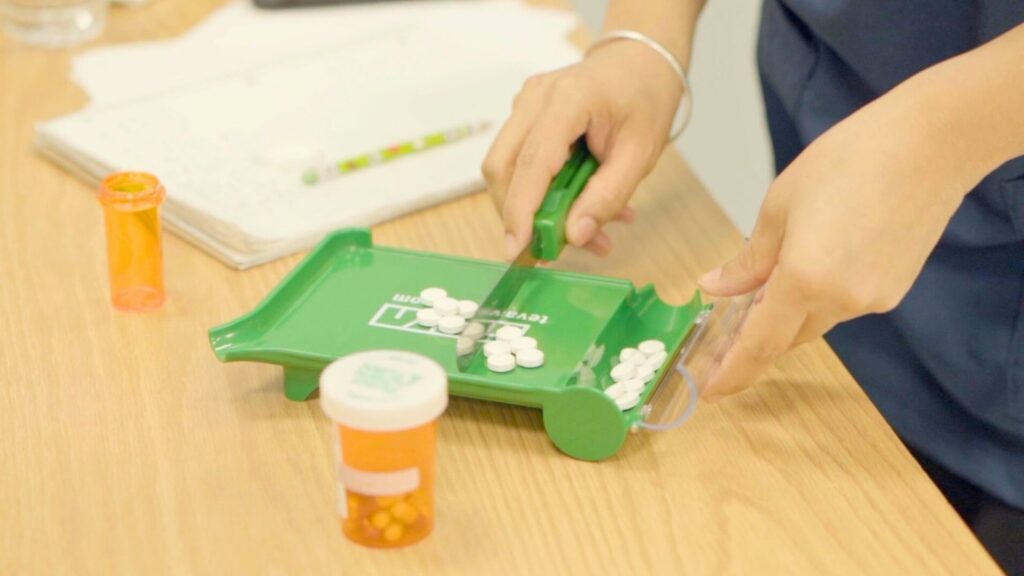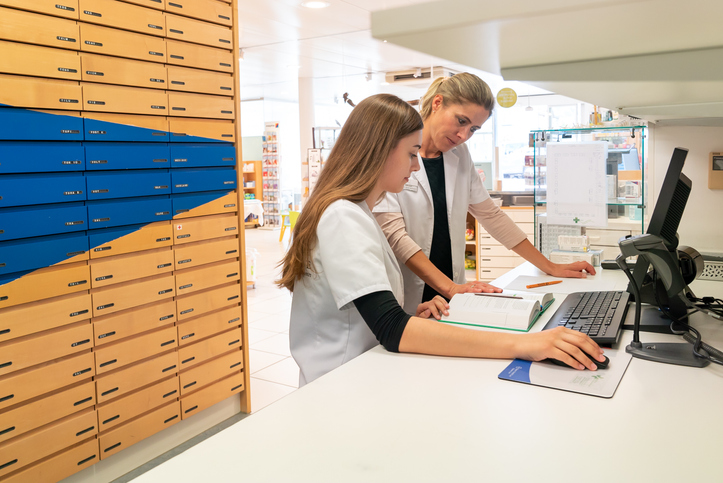Category: Pharmacy Assistant
What’s the Difference Between Pharmacy Assistant vs Pharmacy Technician
April 15, 2024
Have you ever considered the differences between a Pharmacy Assistant and a Pharmacy Technician? Navigating the world of healthcare careers can be challenging, especially when understanding the different roles within a functional healthcare team. At Medix College, we know the importance of making informed decisions about your career path.
Pharmacy Assistant and Pharmacy Technician play vital roles in the pharmaceutical industry, but involve different responsibilities in the professional pharmacy setting. Today we will delve into their roles and explain how our Pharmacy Assistant Diploma can set you on the path to success.
The Role of a Pharmacy Assistant
What is the role of a Pharmacy Assistant? Their responsibilities often include administrative tasks such as answering phones, managing inventory, and maintaining patient records. They are crucial members of the pharmacy team, providing essential support to Pharmacists and Pharmacy Technicians.
Pharmacy Assistants also assist with preparing and labeling medications, and they may handle customer service and sales. Their role primarily focuses on the pharmacy’s operational and clerical aspects, ensuring smooth day-to-day functioning.

The Role of a Pharmacy Technician
Pharmacy Technicians, on the other hand, have a more technical role. They work under the supervision of a Pharmacist and are involved in the preparation and dispensing of medications. Their duties include measuring, mixing, counting, and labeling prescribed medication.
Pharmacy Technicians must also ensure the accuracy of prescriptions, manage medication inventory, and assist with insurance claims. They play a critical role in ensuring patient safety and the accurate dispensing of medications.
Pharmacy Assistant vs Pharmacy Technician – it’s time to explore the differences.
Pharmacy Assistant vs. Pharmacy Technician: What’s the Difference?
While both roles are essential to the pharmacy, there’s a distinct difference between Pharmacy Assistant and Pharmacy Technician. The primary distinction lies in their responsibilities and the level of involvement in medication management.
Pharmacy Technicians have a more hands-on role in preparing and dispensing medications, requiring a deeper understanding of pharmacology and medication management. They also require formal education and certification in most regions.
In contrast, Pharmacy Assistants focus on the pharmacy’s administrative and customer service aspects. What can a Pharmacy Assistant not do? They are barred from managing and advising on medications, and their role does not typically require formal certification. However, having a structured educational background, such as the Pharmacy Assistant Diploma offered at Medix College, can significantly enhance their skills and employability.
The Pharmacy Assistant Program at Medix College
Medix College’s Pharmacy Assistant program is designed to equip students with the knowledge and skills to excel in this rewarding career. Our comprehensive curriculum covers various topics, including pharmacology, medical terminology, and computer applications. Students also learn about inventory management, customer service, and ethical and legal aspects of pharmacy work.

Our program emphasizes hands-on learning with a clinical externship. This allows students to gain real-world experience and build confidence in their abilities. Our experienced instructors provide personalized support, ensuring students are well-prepared for the workforce.
Choosing between a Pharmacy Assistant or a Pharmacy Technician career depends on your interests, skills, and career goals. While both roles are essential to the pharmacy, they offer different experiences and opportunities.
Medix College is committed to providing our students with the education and training needed to succeed in the healthcare industry. Our Pharmacy Assistant program is the perfect starting point for those looking to make a positive impact in the world of pharmacy.
Are you ready to start our Pharmacy Assistant Program?
Contact Medix College to learn more!
Frequently Asked Questions
Question: What is the role of a Pharmacy Assistant?
Answer: Their responsibilities often include administrative tasks such as answering phones, managing inventory, and maintaining patient records.
Question: What can a pharmacy assistant not do?
Answer: They are barred from managing and advising on medications, and their role does not typically require formal certification.

Are you a responsible, detail-oriented worker interested in the pharmaceutical industry? Has the question, how do I become a pharmacy assistant in Canada crossed your mind before? A pharmacy assistant career could be an excellent fit for you. These professionals work under the supervision of a pharmacist or pharmacy technician, performing a wide range of essential tasks to provide patients with the medications they need.
If you’re curious about this career path, keep reading! We’ve created a comprehensive guide to becoming a pharmacy assistant with the tools you need to get started.
What Do Pharmacy Assistants Do?
Pharmacy assistants are essential to the pharmaceutical team, completing various clerical and customer service tasks. Their duties include filling prescriptions, packing and labeling pharmaceutical products, compounding medications, maintaining prescription records, overseeing medication inventory, handling sales transactions, and providing customer service. To thrive in this role, a pharmacy assistant must possess the following soft skills:
- Excellent organizational skills
- Conscientiousness and alertness
- Strong collaborative skills
- A strong desire to help others
- Customer service skills
Does that sound like you? If so, you can enjoy a pharmacy assistant position in a variety of healthcare settings, including:
- Retail pharmacies
- Community pharmacies
- Home healthcare facilities
- Pharmaceutical manufacturers
- Long-term care facilities
- Public health service centers like Methadone clinics
- Hospitals
Discover how to become a pharmacy assistant in Canada to start getting the sought-after industry skills you need to get started.

How to Become a Pharmacy Assistant
Now that you have a fundamental understanding of the role, what level of education do you need to be a pharmacy assistant, and how long does it take to become a pharmacy assistant in Ontario? Let’s explore the process of pursuing this career path, discover the answers to these questions, and more.
As with most professional positions, pharmacy assistants should start their careers with a college diploma that equips them with the fundamental knowledge and skills needed to comprehend the pharmaceutical industry.
In addition, employers value relevant experience, so gaining skills for a pharmacy assistant in a program that provides a practical component is an excellent career move. Our pharmacy assistant course prepares graduates to easily enter the working world.

Start With a Reputable Career Training Program
The 44-week pharmacy assistant diploma program at Medix College is designed to endow students with the theoretical and practical skills they need to become significant assets to pharmaceutical teams.
Along with the history and legislation of pharmacy in Canada, you will learn about pharmaceutical and dispensing medical terminology, interpreting prescriptions, abbreviations, various dosage forms, the classifications of drugs, and much more.
A solid understanding of bodily systems through our anatomy and physiology courses will further strengthen your ability to provide a superior service. You will get hands-on training in labs on industry-specific software and practice various everyday pharmacy assistant tasks. Upon completing our program, you will be fully equipped to meet the demands of a pharmacy assistant position.
Are you ready to start our pharmacy assistant course?
Contact Medix College to learn more!
FAQ
Q: How do I become a pharmacy assistant in Canada?
As with most professional positions, pharmacy assistants should start their careers with a college diploma that equips them with the fundamental knowledge and skills needed to comprehend the pharmaceutical industry.
In addition, employers value relevant experience so gaining skills for a pharmacy assistant in a program that provides a practical component is an excellent career move. Our pharmacy assistant course prepares graduates to easily enter the working world.
Q: What level of education do you need to be a pharmacy assistant?
Pharmacy assistants should start their careers with a college diploma that equips them with the fundamental knowledge and skills needed to comprehend the pharmaceutical industry.
Q: How long does it take to become a pharmacy assistant in Ontario?
The 44-week pharmacy assistant diploma program at Medix College is designed to endow students with the theoretical and practical skills they need to become major assets to pharmaceutical teams.
Interested in Pharmacy Assistant Training? 3 Skills You’ll Need
February 24, 2023Pharmacy Assistants are generally responsible for a number of clerical, administrative, and quality assurance duties. Their main objective is to ensure that a pharmacy is running smoothly. Being a pharmacy assistant may be the ideal career for you if you’re well-organized, attentive and a problem-solver. Since healthcare is a chief concern for the well-being of the public, careers in pharmacy are critically important and in demand. In order to succeed as a Pharmacy Assistant, specialized skills are required. Keep reading to learn about these skills and how Medix College supports you as you strive to develop them.
1. Effective Pharmacy Assistants Are Detail-Oriented
Pharmacy Assistants are responsible for receiving and confirming prescription orders. Before pickup, prescriptions must be processed correctly in order to protect the public’s health and safety because the incorrect medication, dosage, or combination of medications can have harmful or even fatal effects. For this reason, Pharmacy Assistants always pay attention to details and are conscious of the significance of quality in their work, whether they are processing patient data or a prescription order.

At Medix College, students learn how to operate and maintain industry-standard software tools, maintain patient profiles, handle inventory, pay third parties, and more. In order to develop accuracy during Pharmacy Assistant training, practice is your best asset.
2. Excellent Customer Service Skills Will Help You Succeed After Pharmacy Assistant Training
Pharmacy Assistants work in a client-facing role and, oftentimes, they are the first staff members that patients come into contact with when they enter the pharmacy. Effective customer service skills are crucial to patient satisfaction and in effect, the success of a pharmacy. By engaging with patients pleasantly, listening attentively to concerns, answering questions, and referring patients to the pharmacist when needed, you can be of great help to those looking for solutions to their health issues. Remember the nature of each patients’ situations. Likely, they do not feel their best and, as a result, may react emotionally or impatiently to any setbacks or insurance problems. Compassion should guide your customer service duties after earning your Pharmacy Assistant Diploma.

3. Competitive Pharmacy Assistant Candidates Are Tech-Savvy
Pharmacy technology has evolved significantly in recent years. Pharmacy Assistant students wishing to be competitive candidates after graduation must be familiar with industry standard software including word processing tools, data-based platforms, billing software, and more. These skills are covered extensively during the program, and students have the opportunity to build their practical technology skills in our interactive labs.
Our Pharmacy Assistant training program equips students with a vast knowledge-base on the history and legislation of pharmacy in addition to the way our healthcare system works. This helps them to understand the practical skills they develop in the hands-on part of our program, providing a well-rounded educational experience.
Ready to earn your Pharmacy Assistant Diploma in Ontario?
Contact Medix College to learn more about our programs.
Considering Pharmacy Assistant Training? Learn the Importance of Ethics
January 06, 2023In every profession and industry, there are rules or guidelines that regulate the behaviours, attitudes, and methods of professionals in the industry. These rules are known as ethics, and they are indispensable for an industry such as pharmaceuticals, which may be both health and profit-oriented.
Pharmacy Assistants and everyone else in a healthcare team owe a duty of care to the consumer, the business, and other members of the healthcare team. These duties have been spelled out in the profession’s code of ethics.
If you’re considering Pharmacy Assistant training, you’ll need to learn these ethics as they’ll serve as guidelines for your future actions and activities as a practitioner in the industry. In case you are wondering what these ethics are, we’ve highlighted them here.
Your Ethical Duties to Clients After Pharmacy Assistant Training
The role of a Pharmacy Assistant is a very client-facing one. You’ll often be the first contact that clients have with the pharmacy. Your demeanour during interactions with them can colour their impressions of you and the pharmacy one way or the other. As such, you’ll need to carry out your duties in a way that demonstrates respect for their dignity.

Remember that people place a high level of trust in your abilities to correctly fill their prescriptions and effectively handle various other tasks that your Pharmacy Assistant training has prepared you for, including packing and labelling products, maintaining prescription records, and more. It is that trust that makes them seek out your services. Bearing this in mind, always strive to carry out your duties and responsibilities appropriately and professionally. In every instance, set clients at ease, demonstrate concern for their well-being and try as much as you can to be helpful.
Your Ethical Responsibilities to the Business
As much as your focus is on the health and well-being of clients, you also need to keep an eye on the pharmacy’s bottom line. The pharmacy can only continue to help people fulfill their medications if it doesn’t drown in its operational costs.
Since you’ll be handling sales transactions, you’ll be nominally responsible for the business’s finances. One way to ensure that clients seek out your pharmacy first is by delivering excellent customer service every time. Be meticulous about maintaining prescription records and inventories of medication, and handle orders with speed and courtesy. Also, keep track of inventory to ensure that the pharmacy doesn’t run out of essential medicines.
Commitment to Competence and Continuous Self-development
Your training is not expected to stop at the end of your qualification courses. Even after your training ends, you’re expected to keep up-to-date with current industry standards and best practices. One way to do this is by dedicating yourself to lifelong learning and self-development.

To execute your duties optimally, you must ensure that you are competent by completing your Pharmacy Assistant courses. Continuous training as a Pharmacy Assistant will ensure you are better equipped to use health resources responsibly and execute your duties in a way that would benefit you, your customers, and the pharmacy.
Are you interested in earning your Pharmacy Assistant Diploma in Ontario?
Contact Medix College to learn how you can get started.
Earning a Pharmacy Assistant Diploma? How to Prepare For Your Job Search
September 02, 2022Are you passionate about helping people? A rewarding career as a Pharmacy Assistant could be right for you. In this role, you’ll be an invaluable member of a healthcare team, filling prescriptions, maintaining records, providing quality customer service and more. If you’ve already begun training or are considering enrolling in a program, you might be wondering about what the job search process will look like and how to prepare.
Before you begin your job search, you should consider a few important questions. Firstly, ask yourself what your non-negotiables are for your future workplace. What sort of workplace culture do you hope to be a part of? Then, review your resume, or have a friend review it. Does it tell the entire story of your experiences and valuable skills? After these steps, keep reading to discover some key action items to help you prepare for your job search and land the pharmacy assistant position you’re looking for.
After Pharmacy Assistant Training, Seek Out Volunteering and Internship Opportunities
Once you finish your pharmacy assistant training, your first impulse may be to seek a permanent position right away. However, permanent positions may take time to find. In the meantime, consider getting work experience that will enhance your resume, such as participating in a volunteering program or an internship within the healthcare field. Not only will employers be impressed by your initiative, but they’ll also be confident in your ability to fulfill the duties of a pharmacy assistant because you’ve gained prior related experience.

Remember to do Your Research
When you’re searching for a job after completing your pharmacy assistant course, looking for opportunities in the right places will be crucial to your success. For example, researching opportunities on hospital websites, job boards, and the ‘Careers’ pages of pharmaceutical retail websites are all great places to start looking. When you do your research, you’ll find out what kind of positions are available in your area, helping you to maximize your odds by staying aware of more job opportunities than other candidates. When you begin your job search, try checking job posting sites early each morning for the best results.

Don’t Underestimate the Power of Word-of-Mouth
Chances are, you know someone who works in healthcare. If not, a friend of a friend or even a relative surely does. Word of mouth travels quickly, and many employers prefer to hire candidates who have been referred by colleagues, employees or other professionals in the field. In order to increase your chances of success, let everyone in your network know that you’re looking for a job as a pharmacy assistant. It’s likely that one of them will be able to connect you with an opportunity as a pharmacy assistant.
By keeping in mind these job searching techniques, you’re sure to find your dream pharmacy assistant position. Our Pharmacy Assistant Diploma program at Medix College will equip you with the tools and knowledge you need to succeed, as well as comprehensive Career Services to prepare you for your future.
Ready to start your pharmacy assistant diploma in Ontario?
Contact Medix College for more information!
Digitization in the Pharma Industry: An Overview for Those in Pharmacy Assistant Training
August 12, 2022If you are considering becoming a pharmacy assistant, you may be shocked to know that almost half of all drug products in Canada have had a shortage at some point within the last 5 years.
Although the pharmaceutical industry itself is quite advanced in its application of technology, the same has not been true for the digitization of its operations. Growing challenges such as globalization and supply chain complexities are pushing the pharmaceutical industry towards accepting and adapting to the use of modern digital technology to solve these issues.
Digitization will improve all four stages of industrial operations, which consist of planning, sourcing, manufacturing, and distributing. The greatest impact this has on pharmacies and their customers will be the consistent supply of the medicines they need. Keep reading to learn more about the digitization of pharmaceutical operations.
The Digitalization of Pharmaceutical Planning
The pharmaceutical industry has seen improvements in its planning capabilities through the introduction of Enterprise Resource Planning (ERP) systems. However, even with these systems in place, there is no true visibility across networks and supply chain partners due to data incompatibility, disconnected systems, and other challenges. You may encounter the effects of this after your pharmacy assistant training when faced with drug shortages.
Digitization of planning would allow various supply chain partners to virtually communicate with one another in real-time regardless of what type of ERP system they use. The use of cloud platforms and data analytics applications would allow for collaborative planning between manufacturers, suppliers, and customers such as pharmacies and hospitals. With a digital supply chain, there could be instant monitoring of every data parameter throughout every aspect of the network. Digital applications would also allow for inventory management and optimization and even automatic replenishment throughout the entire chain globally. These innovations would significantly decrease the likelihood of drug shortages.

The Digitization of Pharmaceutical Sourcing
Through the digitization of sourcing, changes will be made to the way companies run internally and how they interact with their suppliers. New technology allows for procurement processes to be done automatically, including ordering, approval of purchases, the creation of invoices, and more. In addition, cloud-based technology can also provide up-to-date analytics on spending that can give insights into all sourcing-related activities with user-friendly dashboards that allow for improved sourcing decisions.
The Digitization of Pharmaceutical Manufacturing
The technological boom has created the potential for smarter and more decentralized production. ‘Smart’ digitized pharmaceutical factories can optimize manufacturing through real-time analytics, predictive maintenance, bottleneck identification, and sensor-enabled automation. With the use of digitized production, pharmaceutical companies can improve their Overall Equipment Effectiveness (OEE), not only reducing machine downtime but increasing throughput quality. After completing your pharmacy assistant course, you’ll be exposed to the many new technologies on the horizon affecting medicine. Within the manufacturing realm, this includes the use of robotics and AI, continuous manufacturing, and 3D printing.

The Digitization of Pharmaceutical Distribution
Technological innovations in distribution are already emerging, specifically the use of Radio-frequency Identification (RFID) tags. Tag readers allow for zero human involvement in finding the desired product, packaging it, and preparing it for distribution. Distribution processes can further advance with RFID-tagged pill boxes in hospital and pharmacy cabinets that can automatically replenish drug stocks as needed. As technology advances, inventory processes at manufacturing warehouses can be optimized with the use of RFID tags and scanning drones, which again would only decrease the likelihood of nationwide shortages.
How This Will Affect You After Pharmacy Assistant Training
The digitization of the pharmaceutical industry will allow for virtually connected and increasingly efficient operations systems that will solve many of the issues that lead to drug shortages around the world. As a pharmacy assistant, you’ll be able to provide your customers with the medicine they need when they need it.
At Medix College, we offer short-term, comprehensive courses paired with hands-on training within a real-life healthcare setting. In addition, our career support services will equip you with the tools you need to enter the workforce immediately after graduation allowing you to confidently start your new career helping others.
Are you interested in getting your pharmacy assistant diploma in Ontario?
Contact Medix College for more information today!
The E-Commerce Shift: Insights for Those in Pharmacy Assistant School
July 22, 2022With the lockdowns of the pandemic forcing many companies to close, businesses had to shift their sales approach so that they could continue to reach customers without having a physical store open. Businesses started to turn to the internet and follow the lead of e-commerce companies like Amazon and eBay. Through e-commerce, customers can access an online store and its products and continue to make purchases through the web.
As for the healthcare field, businesses like pharmacies had to find a way to ensure people who had COVID could continue to receive their prescriptions and medical necessities. This is why many pharmacies turned to e-commerce and started offering virtual consulting and online prescription purchasing services. Here’s a closer look at some of the changes to expect with the shift to e-commerce.
Convenient Access to Medical Supplies for Customers
During your pharmacy assistant course, you will see that many pharmacies have developed their online presence. At the same time, they are expanding their customer base and resources. For example, people living in more rural areas now have the opportunity to order their prescriptions and get them delivered at their convenience.
As people grow older, they become more reliant on a range of medical supplies. Having online pharmacies and delivery services ensures that those with reduced capabilities or limited mobility have access to what they need. With new digital technology, a client can even meet with a pharmacist virtually who will prescribe them medication. They can then obtain that medication with fast and convenient delivery.

Better Client Privacy
With online delivery and virtual consulting, customers can expect greater privacy when buying their medication. For many people, picking up prescriptions at the pharmacy can feel intimidating. After pharmacy assistant school, you may see that some people are hesitant about going to the pharmacy and seeking help for a specific condition.
With e-commerce in the pharmaceutical industry, customers can order their prescriptions without being in a public space. From the comfort of their own home, they can get the help they need without the fear of being overheard by other customers in the store.

What the Future Holds For Graduates of Pharmacy Assistant School
As a graduate of pharmacy assistant school, you should be ready for the changes to daily work that e-commerce can bring. Students of Medix College will receive hands-on training in operating typical pharmacy software, entering prescriptions and printing labels, maintaining patient profiles, third-party billing and inventory management. Being vigilant in these duties will become even more important as you handle online patient orders and prepare medications for delivery. With knowledge of the benefits–and challenges–that e-commerce can bring to the healthcare field, you’ll be ready to embrace the new trends and technologies of the future.
Are you interested in receiving a pharmacy assistant diploma in Ontario?
Learn more about our program at Medix College today!
 Pharmacy assistants play an integral role within a pharmacy. They work alongside and under the supervision of pharmacists and pharmacy technicians as they greet customers, help to fill prescriptions under the supervision of a pharmacist, and help with several other tasks.
Pharmacy assistants play an integral role within a pharmacy. They work alongside and under the supervision of pharmacists and pharmacy technicians as they greet customers, help to fill prescriptions under the supervision of a pharmacist, and help with several other tasks.
Helping out with inventory management may also be part of your future career. Inventory management refers to managing the medical supplies and medications that are used within a pharmacy. Effective inventory management is important, as it helps make sure that prescriptions can be properly filled and that customers have access to the medications that they need.
At Medix College, you’ll get hands-on training that will prepare you to launch a successful career as a pharmacy assistant. Read on to learn some tips for managing inventory!
1. Do Physical Inventory Checks After Your Pharmacy Assistant Training
To become good at inventory management after your pharmacy assistant training, you’ll need to–under the supervision and guidance of a pharmacist and/or pharmacy technician–be familiar with the inventory at the pharmacy. By performing regular physical inventory checks, you will know exactly which products are in the pharmacy. This will help you notify the pharmacy team of any important inventory updates they might need to know about. For example, if you see that a medication is about to expire, or that the supply of a particular product is running low, you can inform the pharmacy team so that they can handle orders accordingly. A physical inventory check helps you match the computerized inventory system with what you currently have on the shelves.

2. Watch Out for High Costs
After completing your pharmacy assistant course, you’ll get to work alongside pharmacists and pharmacy technicians, and may be tasked under their supervision with helping to manage the supply of different types of medications. One important point to consider with regards to inventory management is cost. Ordering too much of a product, especially an expensive product that will expire quickly, can lead to high costs and wasted money.
Good data on how much of different products are needed can help to ensure that your team doesn’t accidentally overstock shelves. Implementing a next-day delivery system with distributors can also help to address this issue.
3. Don’t Let Medications Run Out
While it’s important to avoid overstocking, it’s also important to make sure that enough products are stocked so that medications don’t run out. Customers stepping into a pharmacy want to know that they’ll be able to fill their prescriptions and get the products they came for. If they consistently can’t, and need to return once products have been reordered, then they may eventually decide to go elsewhere.

For many, their prescription can be vital to their health and wellbeing, and so difficulties filling their prescription can cause stress. For this reason, proper planning is important. For pharmacies, proper inventory management is essential to success.
Are you interested in a pharmacy assistant diploma in Ontario?
Contact Medix College for more information!
3 Tips for Handling Customer Feedback After Pharmacy Assistant Training
March 04, 2022Handling customer feedback is important for any business, including a pharmacy. Without acknowledging customer feedback, a pharmacy won’t know what direction to take in terms of its business operations or how to further improve customer service.
Read on to discover how you can handle customer feedback like a pro during your career as a pharmacy assistant!
1. Carefully Listen to Your Customers’ Feedback After Pharmacy Assistant Training
Listening is a major ingredient in customer service. When customers provide you with feedback, they’re going out of their way to provide you with valuable information that can help you and everyone else at the pharmacy conduct their business better. Whether the feedback is negative or positive, listening to your customers will help them feel appreciated and let them know that you value their time and input.
Actively listen to your customers’ feedback so that you really and truly understand their perspective. After completing your pharmacy assistant training, your ability to listen to clients will help you provide excellent customer service.

2. Be Friendly and Welcoming When Interacting Face to Face With Customers
Just like listening, being friendly and welcoming is also vital for a pharmacy’s success. Without your welcoming and friendly demeanour, your customers won’t be willing to provide you with the kind of feedback that can help you with your career. Customers who feel uncomfortable and unappreciated won’t be as likely to provide you with their perspective.
After your pharmacy assistant course, you’ll get to interact with various customers throughout your career. Maintaining a friendly and welcoming attitude will show your customers that you care about their wellbeing and value their time. As a result, they may be more likely to approach you and voice their feedback and opinions.

3. Be as Courteous Over the Phone as You Are in Person
There will be occasions when customers call in to ask questions or to provide feedback about their customer experience with the pharmacy. Being as friendly and upbeat over the phone as you are in person will help you address their issues or concerns effectively. You’ll be able to show your customers that you care, demonstrating your high level of professionalism as a pharmacy assistant. When customers provide feedback about their prescription, for instance, don’t interrupt the conversation. Instead, wait, be courteous, and explain to them that you’ll pass them along to the pharmacist who can address the concerns and questions they may have about their medication.
When you attend Medix College to become a pharmacy assistant, you’ll get the opportunity to develop and improve your professionalism as well as your verbal and written communication skills. As a result, you’ll graduate feeling confident about your ability to launch a rewarding career interacting with customers on a regular basis.
Are you interested in earning a pharmacy assistant diploma in Ontario?
Contact Medix College to learn more about our hands-on and comprehensive program!
Here’s Why Communication Skills are Important if You’re Considering Pharmacy Assistant Training
January 14, 2022Communication skills are important to have in any field and even more so in the pharmaceutical and healthcare industry. Dealing with medical prescriptions and addressing customers on a regular basis requires communication skills of the highest level.
At Medix College, we focus on both verbal and written communication skills through our Pharmacy Assistant Diploma Program. We help to prepare you to play an integral role in a healthcare team that provides pharmaceutical services to the community. Read on to learn why communication skills are important for a pharmacy assistant career.
Communication is Key to Customer Service After Your Pharmacy Assistant Training
As a pharmacy assistant, you will communicate with colleagues, dispensary staff, customers and other healthcare providers regularly. Having excellent communication skills helps establish solid relationships with everyone you interact with on a daily basis–particularly when providing customer care. Healthcare providers will always look out for their patients and the same is expected of a pharmacy. It will be up to you and your team, alongside a registered pharmacist, to provide a positive customer experience–and that all depends on possessing excellent communication skills. When you complete the pharmacy assistant training at Medix College, you’ll be prepared to fill prescriptions and handle sale transactions, which are duties that require you to apply your communication skills when interacting with customers.
Communication Skills Are Important for Teamwork
You will learn after your pharmacy assistant course that having excellent communication skills is a great asset in your career, as you establish relationships with other professionals in the workplace. As a pharmacy assistant, you will have to work with pharmacists, pharmacy technicians and other healthcare professionals–which will require you to receive and provide important instructions, or delegate tasks as needed throughout the day. Everyone on the floor should have a clear understanding of what is being communicated. Having excellent communication skills will help you communicate effectively with your colleagues and improve the efficiency of the work environment by avoiding any miscommunication when it comes to ordering prescriptions and providing special medication instructions.

Communication Skills Support Customer Safety
Being able to communicate effectively is an important quality that customers look for in pharmacy assistants, as they navigate the healthcare system to acquire what they need for their wellbeing. As a trained pharmacy assistant, you will have an understanding of medical and pharmaceutical terminology, prescription interpretation, various dosage forms, therapeutic classifications of drugs, as well as an understanding of human anatomy and physiology.

This allows you to assess if anything prescribed to the customer may have adverse effects. In that case, you may have to act accordingly by addressing your concerns with the customer and the prescribing physician in a clear manner. Without strong communication skills, you may not be able to relay your concerns clearly, resulting in delays and risks to the safety of the customer.
At Medix College, you will graduate with the communication skills required to work in retail pharmacies, hospitals, home health care facilities, pharmaceutical manufacturers, community pharmacies, long-term care facilities and public health service clinics.
Ready to earn your pharmacy assistant diploma in Ontario?
Contact Medix College to learn more!











